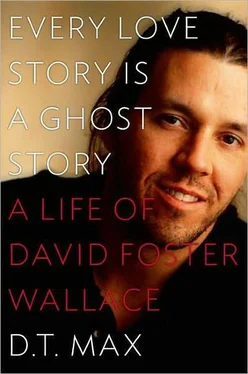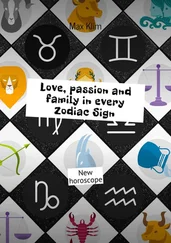Wallace also watched TV in Moore, in a common room that he told Washington smelled of the women students who worked out in it each morning. He watched his usual programs and added Late Night with David Letterman and religious programs on weekends, the latter useful for sections of the novel he had started. Mostly, though, with Costello gone and the novel moving fast, he wrote. As a senior, he was entitled to his own room and the privacy he had little of since high school. The towels came out to be spread over everything. On the wall over the desk of his single, he put the famous photograph of Thomas Pynchon as a bucktoothed undergraduate at Cornell. Most evenings Wallace could be found either at his desk or in Frost Library writing. He had gotten to know Dale Peterson, an English professor who taught a class on the literature of madness. 10Peterson — Wallace nicknamed him “Whale”—was gentle and supportive. He understood Wallace’s enormous gifts and wanted to encourage them. He became Wallace’s thesis adviser and simply let Wallace do as he wished. Wallace could feel the words pouring out, and superstitiously he tried to follow the same routines day after day to keep them coming. He had bought a motorcycle jacket from Charlie McLagan and wore it whenever he was working on the thesis, listening at one point, for example, to U2’s “MLK” and Bruce Springsteen’s “Born in the USA” over and over as he worked. He composed with cheap Bic pens. If he lost one that he had written well with, he would retrace his steps until he found it, then keep using it until it ran out of ink. He referred to these luck-filled pens as his “orgasm pens.”
After he had finished his first draft, he’d type it up on his Smith-Corona, making changes as he went, into the early morning. His typing was so relentless that the student in the next-door dorm room in Moore moved his bed away from their shared wall. Wallace asked Professor Kennick if he could borrow his office, to spare his neighbor the noise of his “Blob-like” and “out of control” English thesis. When McLagan asked him how things were going, Wallace told him the book was coming so fast it was like a scroll unwinding in his head; he wasn’t the author so much as the transcriber. He told Washington that during one three-hour session he had written twenty-four pages. He was so excited that when he wasn’t writing he would go to the gym and do sit-ups until he puked.
Word of his gargantuan project got out — most undergraduate English theses were fifty pages — and stoked his celebrity. He wasn’t above using his renown as a buffer for his long-standing insecurity. After one classmate beat him at tennis, Wallace invited him back to his library cubicle. “I’m writing this five-hundred-page-novel,” he bragged, and showed him his transcript for good measure.
The premise of the novel that became The Broom of the System began, he would later tell his editor, with a chance comment from a girlfriend. She had told him that she would rather be a character in a novel than a real person. “I got to wondering just what the difference was,” Wallace wrote. In addition, he had been mulling over the hoary literary advice given by Lelchuk: “Show, don’t tell.” What did that mean, really, since all writing was telling? But if words were pictures of the things they represented, wasn’t all writing also by definition showing? This last was an extension of the thinking of Ludwig Wittgenstein (“Uncle Ludwig”), whose explorations of the relationship between language and reality were becoming more and more interesting to Wallace. His enthusiasm for technical philosophy was declining, and Wittgenstein was filling the gap. The Viennese philosopher had written two very different treatises on language. In one, as a young man, he wrote that language mirrors reality, that the concept of an abstract thought is meaningless — words correspond to reality in the same way that a photograph corresponds to the thing photographed. The concomitant of this idea, in Wittgenstein’s idiosyncratic vision, is that you can with certainty know nothing outside of yourself. This identification—“the loss of the whole external world,” as Wallace put it to a later interviewer — frightened him but also intrigued him deeply. He considered the opening statement of the Tractatus Logico-Philosophicus , in which Wittgenstein laid out this thesis, one of the two “most beautiful opening lines in Western Lit”: “The world is everything that is the case.” 11Language — and by extension thought — only had dominion over things of which we can have direct sensual knowledge. The Tractatus ’s preface begins, “This book will perhaps be understood only by those who have themselves already thought the thoughts which are expressed in it — or similar thoughts.” If the Tractatus wasn’t calling out for him, nothing was.
But he also knew that Wittgenstein had gone on to reverse his early thinking and come later to the idea that language was communal, a Ponzi scheme based on shared acceptance; language, in Wittgenstein’s later appraisal, was like a game. This point of view also spoke to Wallace, with its invitation to unleash his sense of humor and verbal playfulness. Later, Wallace would make the issues Wittgenstein raised in him seem trite and funny. To an interviewer he would describe Broom as banal, a covert autobiography, “the sensitive tale of a sensitive young WASP who’s just had this midlife crisis that’s moved him from coldly cerebral analytic math to a coldly cerebral take on fiction…which also shifted his existential dread from a fear that he was just a 98.6°F calculating machine to a fear that he was nothing but a linguistic construct.” But at the time the implications of Wittgenstein’s theories were very alive for him. After all, late Wittgenstein was Wallace well; early Wittgenstein, the author depressed.
Wallace’s fictional manuscript and the philosophy thesis were also of a piece: both asked whether language depicted the world or in some deeper way defined it and even altered it. Does our understanding of what we experience derive from objective reality or from cognitive limitations within us? Is language a window or a cage? Of course, Wallace, with his mental travails, wanted a real and truthful view, or at least a benign and playful illusion. There was a favorite example of the vibrant bond between language and objects that Wallace and his friends kicked around in Valentine. Which was the more important part of a broom, the brush or the handle? Most people would say the brush, but it really depended on what you needed the broom for. If you wanted to sweep, then indeed the bristles were the important part; but if you had to break a window, then it was the handle.
Wallace set his story in the near future, 1990, and to give these sorts of philosophical questions an airing, he created twenty-four-year-old Lenore Stonecipher Beadsman, a recent graduate of Oberlin College (though all her female relatives went to Mount Holyoke and all her male ones to Amherst). Like Wallace in college, Lenore is a switchboard operator. And like women in general to Wallace, she is a mystery, a cipher, an erotic object for the male eye. Dressed in a “uniform of white cotton dress and black Converse hightop sneakers,” she is “an unanalyzable and troubling constant,” an uncomfortable soul who “works in neurosis like a whaler in scrimshaw.” At root what worries her is whether she is real or made up. As her boyfriend, Rick Vigorous (Amherst, class of ’69), comments:
She simply felt — at times, mind you, not all the time, but at sharp and distinct intuitive moments — as if she had no real existence, except for what she said and did and perceived and et cetera, and that these were, it seemed at such times, not really under her control.
Читать дальше












